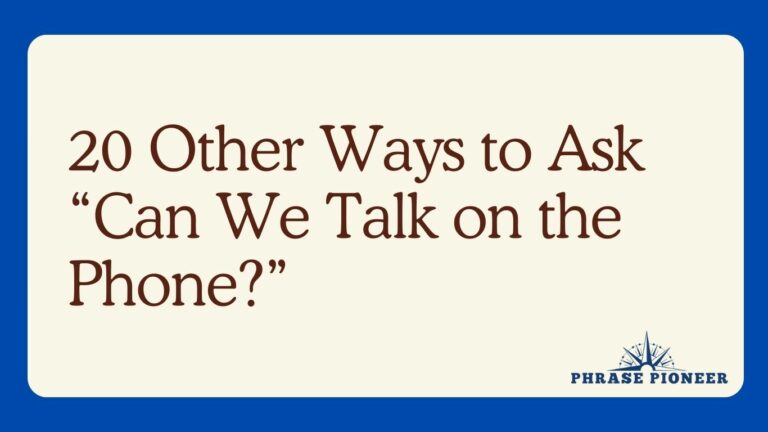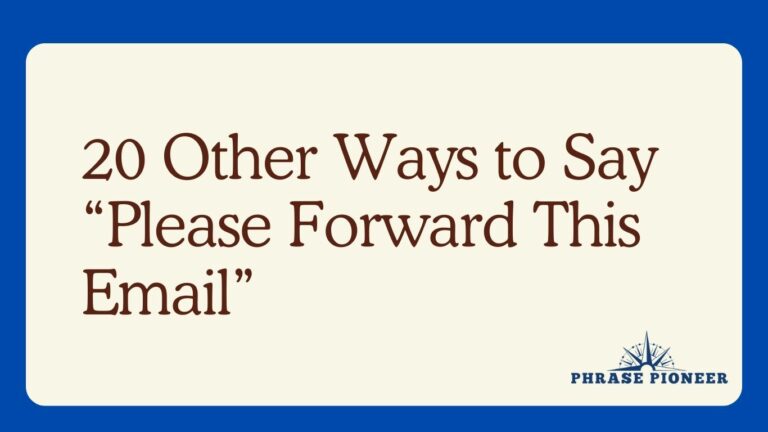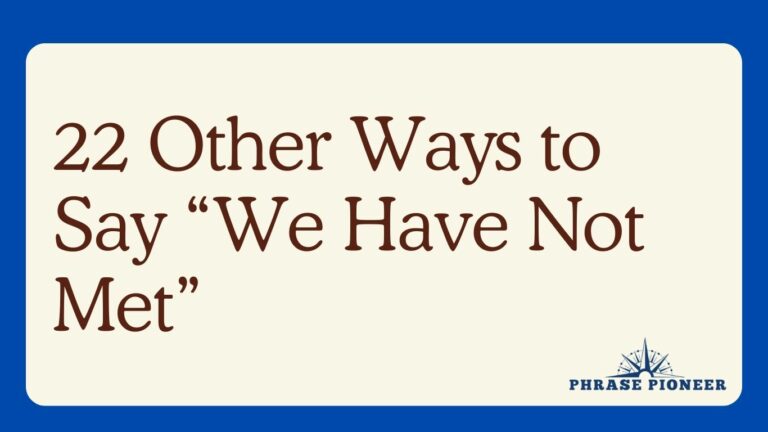20 Other Ways to Say “Looking Forward to Your Feedback”
Soliciting feedback can be a crucial step in improving a project, a product, or personal performance.
The phrase “Looking forward to your feedback” conveys anticipation and highlights the value of the forthcoming critique or suggestions.
Depending on the context, different variations of this phrase might be more appropriate.
Here are 20 alternative ways to express eagerness for feedback, each with an example and explanation.
Anticipatory Phrases
Eager to hear your thoughts.
- Example: “I’ve made the changes you suggested and am eager to hear your thoughts.”
- Explanation: This phrase conveys energy and a keen interest in understanding the respondent’s point of view.
Excited to receive your input.
- Example: “Your insights are always valuable, and I’m excited to receive your input on this matter.”
- Explanation: Shows that not only are you waiting for the feedback but you’re also enthusiastic about it, implying it’s highly regarded.
Awaiting your evaluation with interest.
- Example: “We’ve completed the prototype and are now awaiting your evaluation with interest.”
- Explanation: Suggesting that the feedback will be a significant point of learning or decision-making.
Professional Expressions
Your opinion would be greatly appreciated.
- Example: “As we develop this program, your opinion would be greatly appreciated.”
- Explanation: This is a more formal way to request feedback, emphasizing the value placed on the other person’s perspective.
Keen to receive your perspective.
- Example: “We’ve taken a new approach this time and are keen to receive your perspective on the initiative.”
- Explanation: Indicates a strong desire to understand the feedback from the point of view of someone’s distinct experience or knowledge.
I welcome your review of the work.
- Example: “As a respected expert in the field, I welcome your review of the work we have done.”
- Explanation: This conveys openness and a sense of honor attached to the person whose feedback is being sought.
Requesting Guidance
I reckon your feedback will be invaluable.
- Example: “Given your expertise, I reckon your feedback will be invaluable to our project.”
- Explanation: Implies that you consider the person’s insights to be beyond beneficial, almost necessary, for success.
I value your discernment; please share your feedback.
- Example: “I value your discernment greatly; please share your feedback when possible.”
- Explanation: Signifies that you hold the person’s judgment in high esteem and are soliciting their candid feedback.
Awaiting your insights with anticipation.
- Example: “Your analysis has always guided us; we are awaiting your insights with anticipation.”
- Explanation: Indicates that prior feedback has been a guiding force and that similar anticipation surrounds current expectations.
Expressing Appreciation
I would appreciate your expertise on this.
- Example: “You have a keen eye for these details, and I would appreciate your expertise on this.”
- Explanation: Shows that the request for feedback is driven by an appreciation for the person’s specialized skills or knowledge.
Looking forward to your esteemed advice.
- Example: “We are on the brink of a major decision and look forward to your esteemed advice.”
- Explanation: This formal expression conveys respect and significant expectation from the upcoming feedback.
Would be glad to have your feedback.
- Example: “I feel that this draft is almost there and would be glad to have your feedback.”
- Explanation: Reflects a more personal eagerness and pleasure in receiving feedback that will possibly lead to improvements.
Open Invites
Your input would be most welcome.
- Example: “This project is very close to our team’s heart, and your input would be most welcome.”
- Explanation: Indicates that the feedback is not just wanted but would be received warmly and with appreciation.
I’m open to any suggestions you have.
- Example: “This is a unique challenge for us, and I’m open to any suggestions you have.”
- Explanation: Suggests that there is no preconceived notion of what the feedback should be and that there is a willingness to consider all types of input.
I’m all ears for your suggestions.
- Example: “The first version has rolled out, and now I’m all ears for your suggestions on enhancement.”
- Explanation: This idiomatic expression implies you are ready and prepared to listen closely to what they have to say.
Encouraging Dialogue
Please provide your constructive criticism.
- Example: “To grow, we rely on honest assessments, so please provide your constructive criticism.”
- Explanation: Encourages an open and honest exchange with the intention of mutual growth and improvement.
Eager for your critiques and comments.
- Example: “The beta version is now live, and we are eager for your critiques and comments.”
- Explanation: Shows a well-rounded receptiveness to both positive and negative feedback.
Anticipating your valued feedback.
- Example: “As we streamline the user experience, we are anticipating your valued feedback.”
- Explanation: Expresses that the feedback is not only expected but is given a place of value in the decision-making process.
Invitational Requests
Your review would be very helpful.
- Example: “As I look to fine-tune the details, your review would be very helpful.”
- Explanation: Recognizes the practical assistance the feedback will provide, presenting it as both needed and beneficial.
I am keenly awaiting your review.
- Example: “Given the complexity of the issue, I am keenly awaiting your review to help us navigate it.”
- Explanation: This phrase underscores the significance of the feedback in navigating complex situations.
I’m curious to hear what you think.
- Example: “This is a departure from our usual style; I’m curious to hear what you think about it.”
- Explanation: Communicates a genuine, almost scientific interest in another’s opinion, reflecting openness to learning.
In conclusion, articulating your anticipation for feedback is essential in various professional and creative endeavors.
It denotes a readiness to engage, an eagerness to improve, and a respect for the opinions and expertise of others.
Whether you’re seeking a final assessment or continuous improvement, how you express your request can influence the quality and candor of the feedback you receive.
By using thoughtful phrases to solicit feedback, you foster a more dynamic exchange of ideas and encourage a culture of open communication and development.







